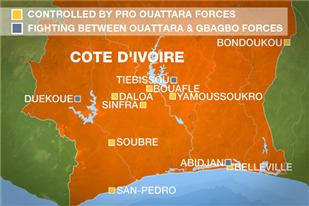French forces secure country’s main airport, a day after committing a massare which killed 800 people at least.
 One hundred and sixty seven foreigners, including French and Lebanese nationals, have left violence-hit Abidjan on special flights to Dakar, a French military spokesman said on Sunday.
One hundred and sixty seven foreigners, including French and Lebanese nationals, have left violence-hit Abidjan on special flights to Dakar, a French military spokesman said on Sunday.
"Seventy-seven, mostly French, left overnight and 90 in the afternoon (Sunday). These were not evacuations but options given to leave," Frederic Daguillon said.
"This afternoon, there were many nationalities, notably Lebanese. The destination is Dakar passing through Lome," he added.
French forces secure country's main airport as forces mass in battle to control Ivory Coast's commercial capital.
Reporting the French intervention, state television urged the city's residents to mobilize and protect Laurent Gbagbo, the incumbent president.
The French army took over since last night the airport of Felix Houphouet Boigny. Seven cargo planes, transporting a hundred tanks and more than 2,000 soldiers, elements of the airport squadron have been taken prisoner. State television reported as well.
The latest developments come as a fierce standoff intensified between fighters loyal to Gbagbo and his rival for power Alassane Ouattara, the country's internationally recognized leader.
Gbagbo's force retook the bridge leading to his presidential palace on Saturday after the opposition had appeared poised to topple him.
THE MASSACRE
The latest fighting follows an alleged massacre of hundreds of people in the small town of Duekoue in the west.
A Catholic charity, Caritas, said up to 1,000 people had been killed by unknown attackers wielding machetes and guns. The International Committee of the Red Cross (ICRC) earlier estimated the death toll at around 800 people.
The United Nations says it is investigating the alleged mass killings.
UN chief Ban Ki-moon demanded on Sunday that Ivory Coast's internationally recognized president Alassane Ouattara take action against followers who took part in a massacre of the about 800 people.
Moreover, Ouattara denied to Ban in a telephone conversation late Saturday that his followers were involved in events in the western town of Duekoue.
The United Nations has already warned Gbagbo and his camp of crimes against humanity investigation by the International Criminal Court into attacks on civilians since the country's election in November.
REINFORCEMENTS
Even in the face of a rapid military advance by pro-Outtara forces that has taken nearly 80 per cent of the national territory, Gbagbo has rejected calls to step down.
While Ouattara's supporters faced little initial resistance in their swift push south, they now face Gbagbo's most reliable fighters, the roughly 2,500-strong elite Republican Guard, clustered in Abidjan along with remaining regular army troops.
Gbagbo's military spokesman Alphonse Guano made a televised address on Saturday, calling on security forces to report for duty to resist attacks by forces loyal to Ouattara.
Flanked by other soldiers, Guano said the state security forces were "being attacked by opportunistic forces including the United Nations, French forces and rebels".
Gbagbo's allies have also urged people to form a human shield to protect the palace from Ouattara's forces, witnesses said.
An estimated 2,000 soldiers of the Republican Guard "appear to be digging in and fighting to the last minute," they noted, while armed members of the "young patriots," the youth wing of Gbagbo''s camp, have evolved into a "force to be reckoned with".MASS KILLING
On Saturday an ICRC spokeswoman condemned intercommunal violence in Duekoue that it said had left hundreds dead. Hundreds of UN peacekeepers are based in the town.
It was not clear what prompted the killings and whether the fighters were involved but Dorothea Krimitas, an ICRC spokeswoman, said that the death toll may rise as investigations on the ground continue.
Farhan Haq, a UN spokesman, said the UN High Commissioner for Human Rights has received "unconfirmed but worrying reports" that the pro-Ouattara force "has been committing human rights violations" during the advance toward Abidjan.
Since the disputed election, Ouattara had worked to rally international support for an armed intervention led by either the UN or a regional force to avoid the impression that he had taken the country by violent means.
Ouattara's aides said he exhausted all diplomatic options before giving the armed group the go-ahead.
Ouattara was recognized as the winner but Gbagbo, the incumbent leader, refused to stand down.
The United Nations has about 11,000 peacekeepers in Ivory Coast and Ban KI-Moon has thrown a lot of political weight into the campaign to force Gbagbo to stand down.
